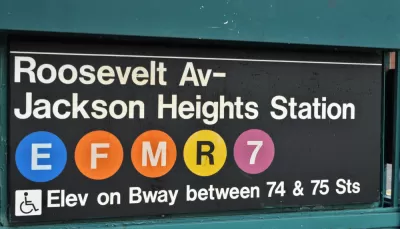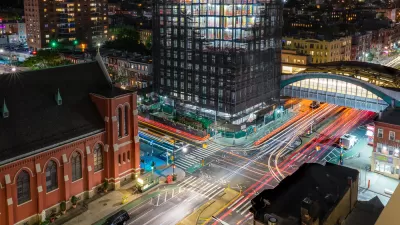People who can't vote can still have a say in the processes by which their neighborhoods are planned and developed. An example from New York City illustrates the point.

Oscar Perry Abello reports on the work of the neighborhood group Queens Neighborhood United in New York City as an example of how community-based planning can give voices to people cut off from other mechanisms of democracy.
"Many of Queens Neighborhood United’s members can’t vote, but they can still make their voices heard," explains Abello. "[T]his is also a story about what it looks like to participate in community development and democracy, in an era where citizenship status can exclude people who are by other measures lawful, productive members of society."
The most recent campaign championed by Queens Neighborhood United is an opposition to a proposed Target development in a corridor zoned for local business. "Queens Neighborhoods United met the Target developer and the Department of Buildings in New York State Supreme Court this past January to force construction at the site to stop while their zoning challenge continues to play out," explains Abello. The case failed to stop construction, but a second hearing is expected at the Board of Standards and Appeals in May.
FULL STORY: Facebook Twitter Email How All Residents — Not Just Citizens — Have a Voice in Planning

Planetizen Federal Action Tracker
A weekly monitor of how Trump’s orders and actions are impacting planners and planning in America.

Map: Where Senate Republicans Want to Sell Your Public Lands
For public land advocates, the Senate Republicans’ proposal to sell millions of acres of public land in the West is “the biggest fight of their careers.”

Restaurant Patios Were a Pandemic Win — Why Were They so Hard to Keep?
Social distancing requirements and changes in travel patterns prompted cities to pilot new uses for street and sidewalk space. Then it got complicated.

Albuquerque Route 66 Motels Become Affordable Housing
A $4 million city fund is incentivizing developers to breathe new life into derelict midcentury motels.

DC Area County Eliminates Bus Fares
Montgomery County joins a growing trend of making transit free.

Platform Pilsner: Vancouver Transit Agency Releases... a Beer?
TransLink will receive a portion of every sale of the four-pack.
Urban Design for Planners 1: Software Tools
This six-course series explores essential urban design concepts using open source software and equips planners with the tools they need to participate fully in the urban design process.
Planning for Universal Design
Learn the tools for implementing Universal Design in planning regulations.
Heyer Gruel & Associates PA
JM Goldson LLC
Custer County Colorado
City of Camden Redevelopment Agency
City of Astoria
Transportation Research & Education Center (TREC) at Portland State University
Camden Redevelopment Agency
City of Claremont
Municipality of Princeton (NJ)





























